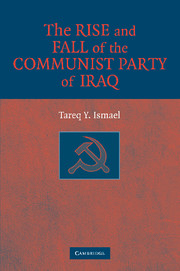Book contents
- Frontmatter
- Contents
- Preface
- 1 The Communist Party of Iraq: Origins and Foundations
- 2 Ascent of the ICP in Iraqi Politics
- 3 Party Rift: The Emergence of the Central Leadership
- 4 Alliance with the Baʿth
- 5 The Rebirth of the Central Leadership in the 1970s
- 6 Crisis: Disintegration or Renewal?
- 7 Conclusion: From Vanguard Activism to Rearguard Opportunism
- Index
4 - Alliance with the Baʿth
Published online by Cambridge University Press: 24 November 2009
- Frontmatter
- Contents
- Preface
- 1 The Communist Party of Iraq: Origins and Foundations
- 2 Ascent of the ICP in Iraqi Politics
- 3 Party Rift: The Emergence of the Central Leadership
- 4 Alliance with the Baʿth
- 5 The Rebirth of the Central Leadership in the 1970s
- 6 Crisis: Disintegration or Renewal?
- 7 Conclusion: From Vanguard Activism to Rearguard Opportunism
- Index
Summary
The autumn of 1967 found the Iraqi communist movement in disarray with schisms within the Party over the emergence of the Central Leadership and a decline in the Iraqi Communist Party-Central Committee (ICP-CC). Recognizing the communist movement's weakened condition, the Baʿth regime, which had assumed power in July 1968, expressed an interest in cooperating with the ICP-CC. Such a relationship would provide the Baʿth with an opportunity to consolidate its power domestically, through appearing tolerant to leftists generally and to communists in particular. Moreover, it raised hopes of a possible opening to a relationship with the Soviet Union.
In response to these overtures from the new regime in Baghdad, the ICP-CC invited representatives of the Baʿth Party into leadership positions within some International Front communist organizations, such as the Majlis al-Silm al-Waṭanî (Council of National Peace). To accommodate the Baʿth, and to distinguish the organization from its communist origins, which dated back to the 1950s, the council's name was altered to Al-Majlis al-Waṭanî lil Silm wa al-Taḍâmun (National Council for Peace and Solidarity). The Baʿthists responded favourably and accepted seats on the the National Council for Peace executive board. Their strategy was to reduce the influence the communists had acquired through their leadership of these mass organizations. In addition, the ICP-CC facilitated the Baʿth's move into the Afro-Asian Solidarity Council, which the communists had been involved with for almost two decades.
- Type
- Chapter
- Information
- The Rise and Fall of the Communist Party of Iraq , pp. 166 - 203Publisher: Cambridge University PressPrint publication year: 2007

